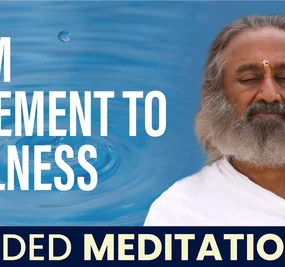In Swami Vivekananda , one finds the perfect convergence of love for the Divine and love for the nation. He is an eternal inspiration for the youth.
~ Gurudev Sri Sri Ravi Shankar
Swami Vivekananda’s birth anniversary is declared as National Youth Day. The original youth icon. Somebody who continues to inspire generations. Although there are many things to learn from the lives of great people of the past, rarely do we know how to implement the lessons. To make it easier for you, we have first listed seven wonderful lessons from Swami Vivekananda’s life and ways to imbibe them in our own.
PS: These lessons are very simple. They can be inculcated at any stage of life. For this world needs sensitive, compassionate and kindness from everyone.
In a nutshell Life Lessons from Swami Vivekananda
- Lesson 1: Humility is a precious virtue
- Lesson 2: Curiosity is essential in life
- Lesson 3: Compassion and kindness are ever golden
- Lesson 4: With prayer, we can sail through any storm
- Lesson 5: Work for preserving unity
- Lesson 6: Respect for culture and belief is necessary
- Lesson 7: Have a holistic perspective
- Lesson 8: Humor is a sign of intelligence
An exemplary life
Who was Swami Vivekananda? He represents an ideology, courage, progressive thinking, strength and wisdom. A legend among people. Born as Narendra Nath Dutta on January 12, 1863, Swami Vivekananda had seven siblings. From childhood, Narendranath was a very sharp child and consistently excelled in academics. During his childhood, India was under the British rule. He initially abstained from studying the English language for some time knowing that it is the language of the Britishers, but later he had to learn it as it was a part of his syllabus. He got interested in many subjects such as sports, music, gymnastics, wrestling, bodybuilding etc.
He completed his M.A in philosophy from a college in Kolkata and later became a great scholar of philosophy. His teachings emphasised on different aspects of religion, faith, education, spirituality, and humanity. He undertook the mission of spreading the knowledge of his Guru, Ramakrishna Paramahansa.
Later, Narendranath came to be known as Swami Vivekananda. Among his many other works, the Brahmo Samaj and Ramakrishna Mission were committed to work for the welfare of society, spread religious harmony and eradicate poverty and misery.
A man with such high thinking and simple living has lived a life that can be a lesson for all of us. Let’s take a look at some of the famous stories from his life:
Lesson 1: Humility is a precious virtue
I recollect the many inspiring bedtime stories my dad read to me. One such incident happened when Swami Vivekananda was in England. While conversing, Swami Vivekananda corrected his friend’s English. The friend retorted that English was his mother tongue and hence, could not be corrected.
Swami Vivekananda smiled and humbly responded, “I know the use of language because I have learnt the language while you have picked the language.” Listening to this witty reply, the friend was left overwhelmed.
This is one of innumerable incidents where Swamiji impacted society with his brilliance, knowledge, logic and a sense of compassion.
Life’s lesson:
There are times when people retort and ask us questions, especially when we correct them. In such times, humility in our answer can help lighten the situation and save the bond from breaking. Remembering Swami Vivekananda’s this story can help us be aware of our replies, without losing the balance or getting offended.

Lesson 2: Curiosity is essential in life
Swami Vivekananda always had a quest to know whether God really exists? The query made him restless. But Ramakrishna answered his question. He said, “Yes, I have seen God.”
Though his physical appearance and simplicity did not appeal to Swami Vivekananda initially, but later it was Ramakrishna who gave him answers. He told Swami Vivekananda, “I have seen God just as I am seeing you right now. God is in every human, you just need is an eye to find him,” and Swami Vivekananda was convinced.
Life’s lesson:
We must strive to get the best and holistic answers to ease out our curiosity about life. Curiosity about higher truths of life has transformed many lives. Remember, appearance can be deceiving!
Lesson 3: Compassion and kindness are ever golden
One day Swami Vivekananda’s mother asked him to give her a knife. Swami Vivekananda brought the knife and held the sharp side of the knife and gave the covered side to his mother. The mother at once got impressed with him and told him he was ready to work for the welfare of society. He asked his mother the reason for her thoughts. She replied: The way you handed me the knife, holding the sharp side in your hand preventing me from getting hurt, exhibited his compassion and kindness. It is said she further asked Swami Vivekananda to have the same care and compassion for all the people and the society.
Life’s lesson:
Many a time, we exhibit small acts of kindness around our loved ones and friends. We can encourage human values by praising their good qualities, thus enabling them to continue doing good in society. Also, compassion and kindness is inherent in each one of us.
Lesson 4: With prayer, we can sail through any situation
When Swami Vivekananda’s family was in a crisis, he asked Ramakrishna to pray for them. Listening to this, Ramakrishna suggestion was that he visited the temple and pray himself. Swami Vivekananda visited the temple thrice. However, he instead asked for discretion (viveka) and dispassion (vairagya). This marked the beginning of his spiritual life.
Life’s lesson:
In turbulent times, our prayer defines our virtue. Gurudev Sri Sri Ravi Shankar says that you will not be given strength, but the opportunity to be strong. Similarly, you will not be given faith, but an opportunity to have faith. Thus, asking for the right thing in prayer can bring great depth in the way we lead life and help us invoke the inner strength to sail through the storms.
Lesson 5: Work for preserving unity
Swami Vivekananda went to the World Parliament of Religions as a representative of the Hindu religion. It was a prestigious platform to put forth the right understanding and the fundamentals of Hinduism. In the parliament, there were many eloquent speakers who had come well-prepared for their respective speech.
Let’s go deeper into discovering amazing India! This country has a wealth of spiritual and wellness knowledge. Untap some of those secrets and discover your potential with these timeless wisdom nuggets. Know more at The Art of Living Meditation and Breath program.
When Swami Vivekananda’s turn came, he addressed the audience as ‘sisters and brothers of America’ which became very popular. His way of speaking connected with the audience.

Life’s lesson:
With our words, we can make people feel comfortable in our presence or repel them. Having purity of speech is a prerequisite if we want to build and sustain cordial relations in this world, especially in the corporate world. Warm and kind words have a great potential to strike the chord of brotherhood and oneness in people.
Mahatma Gandhi visited the Belur Math in 1921 and spoke on Swami Vivekananda’s birth anniversary:
“I have gone through his works very thoroughly, and after having gone through them, the love that I had for my country became a thousand fold. I ask you, young men, not to go away empty-handed without imbibing something of the spirit of the place where Swami Vivekananda lived and died.”
Lesson 6: Respect for culture and belief is necessary
One day, a Britisher commented that the Indian dressing style was ‘uncivilized’. Swami Vivekananda replied, “In your culture, cloth builds a man but in our culture, character builds a man’. This story became very famous the world over, showcasing Swami Vivekananda’s deep understanding of the world.
Life’s lesson:
Let’s respect our culture and traditions. Culture, traditions and beliefs make every community unique. And our own reasoning about their significance, importance enables us to help clear others’ doubts, perception or ideas.
Lesson 7: Have a holistic perspective
At the World Parliament of Religion, Swami Vivekananda observed that the Indian epic, the Bhagavad Gita, was kept at the lowest rank. This can have many interpretations, but what impressed me was the way Swami Vivekananda began his speech. Referring to the position of the Bhagavad Gita, he said, ‘…good foundation’. He gave a witty answer and felt proud instead of feeling inferior about Hinduism.
Life’s lesson:
A thorough understanding of your belief and religion can shape your perspective in a holistic way. It helps us get a deeper understanding of our culture and also we can explore other cultures with equal respect.
The famous Chicago speech at the Parliament of World Religions, 1893: “I am proud to tell you that we have gathered in our bosom the purest remnant of the Israelites, who came to Southern India and took refuge with us in the very year in which their holy temple was shattered to pieces by Roman tyranny. I am proud to belong to the religion which has sheltered and is still fostering the remnant of the grand Zoroastrian nation. I will quote to you, brethren, a few lines from a hymn which I remember to have repeated from my earliest boyhood, which is every day repeated by millions of human beings: “As the different streams having their sources in different paths which men take through different tendencies, various though they appear, crooked or straight, all lead to Thee.”
An excerpt from the closing ceremony: The seed is put in the ground, and earth and air and water are placed around it. Does the seed become the earth, or the air, or the water? No. It becomes a plant. It develops after the law of its own growth, assimilates the air, the earth, and the water, converts them into plant substance, and grows into a plant. Similar is the case with religion. The Christian is not to become a Hindu or a Buddhist, nor a Hindu or a Buddhist to become a Christian. But each must assimilate the spirit of the others and yet preserve his individuality and grow according to his own law of growth.
Lesson 8: Humor is a sign of intelligence
Gurudev once shared a story from Swami Vivekananda’s life. Here’s the excerpt:
“At a restaurant, Swami Vivekananda sat at the same table with his professor. The professor remarked: “A pig and a bird can’t dine at the same table.”
Swami Vivekananda replied, “Sir, whenever you tell me, I will fly away.”
Intelligence has the ability to turn every conflict into humor. Humor is another sign of intelligence. If you have humor, you will overcome any conflicting situation.”
Life’s lesson:
Like Gurudev summed up, humor is a sign of intelligence. We can make times good and even most dramatic circumstances lighter with humor.
Through his reforms, Swami Vivekananda brought a remarkable change in the society. His work, thoughts, ideas gave a new direction to the masses. Reading and knowing about the life of Swami Vivekananda is very inspiring for the youth of today and will remain the same for the upcoming generations.
With these valuable lessons, here’s to a new 2020! Some lessons life teaches us, but there are some lessons that we can learn from others.
Swami Vivekananda’s teachings will ensure a happier life for us and others.
And here’s a quick tip. If you’re wondering how to imbibe these lessons in your life, here’s a secret to live with joy and selfless service:
- Meditate: Increase your potential and happiness quotient. Everyday activities and frustrations of the day can make us stressed. But when you practice effortless meditation everyday for 20 minutes, it throws out toxins, and keeps your mind fresh. Awareness increases in a fresh mind. So, start meditating today!
- Yoga: Yoga is an easy way of maintaining the mind-body complex and keeping it healthy. Good mental and physical health will enable you to help others and live with joy yourself. Simple yoga asanas will give a boost to your health.





















